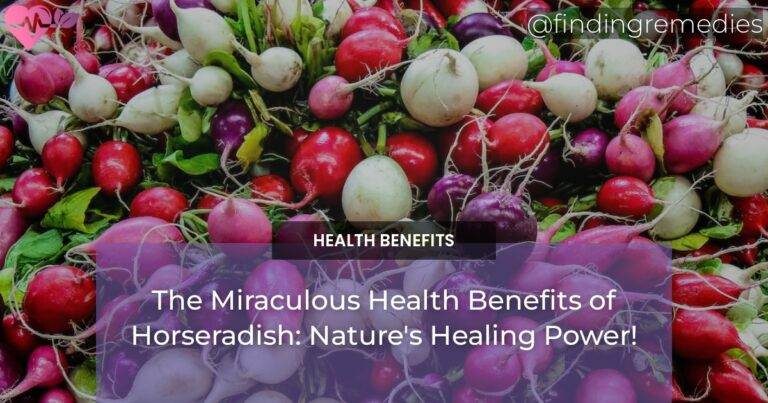Health Benefits of Horseradish
If you’re looking to add a flavorful and nutritious ingredient to your meals, horseradish is a great choice. This root vegetable has been used for centuries in traditional medicine and is known for its many health benefits. In this article, we’ll take a closer look at the nutrition profile, natural compounds, and healing properties of horseradish.
Nutrition Profile
Horseradish is a low-calorie vegetable that is high in fiber, vitamin C, and potassium. A 100-gram serving of horseradish contains:
- 48 calories
- 10.6 grams of carbohydrates
- 3.2 grams of fiber
- 1.2 grams of protein
- 569% of the daily value for vitamin C
- 246 milligrams of potassium
Horseradish is also rich in antioxidants and natural compounds that have been shown to have many health benefits.
Natural Compounds in Horseradish
Horseradish contains a variety of natural compounds that contribute to its health benefits. These include:
- Glucosinolates – compounds that have been shown to have anti-cancer properties
- Flavonoids – antioxidants that can help protect the body from damage caused by free radicals
- Phenolic acids – compounds that have anti-inflammatory properties and may help protect against heart disease and cancer
- Volatile oils – compounds that have antibacterial and anti-inflammatory properties
Healing Properties of Horseradish
Antimicrobial Activity
Horseradish has been shown to have antimicrobial properties, which means it can help fight off harmful bacteria and viruses. This makes it a great addition to your diet during cold and flu season.
Anti-inflammatory Properties
Horseradish contains several compounds that have anti-inflammatory properties, including phenolic acids and flavonoids. These compounds may help reduce inflammation in the body, which can help protect against chronic diseases like heart disease and cancer.
Antioxidant Activity
Horseradish is rich in antioxidants, which can help protect the body from damage caused by free radicals. Free radicals are unstable molecules that can damage cells and contribute to aging and chronic diseases like cancer and heart disease.
Cancer-Fighting Properties
Horseradish contains glucosinolates, which have been shown to have anti-cancer properties. These compounds may help inhibit the growth and spread of cancer cells.
Effects of Cooking and Proper Storage
Horseradish can be eaten raw or cooked. Cooking can help reduce the pungent flavor of horseradish, making it more palatable for some people. Proper storage is also important to maintain the quality and nutrition of horseradish. Store horseradish in the refrigerator and use within a few weeks of purchase.
Risk Factors and Precautions
Horseradish is generally safe for most people to eat, but there are a few precautions to keep in mind. Horseradish can be very pungent and may cause irritation to the nose and eyes when grated or chopped. It can also cause digestive distress in some people, especially in large amounts.
Types and Varieties of Horseradish
Horseradish comes in several varieties, including:
- Common horseradish – the most widely available variety, with a pungent flavor
- Bohemian horseradish – a milder variety that is popular in Europe
- Red horseradish – made with beets, which gives it a bright red color
Advantages and Disadvantages of Consuming Horseradish
Overall, horseradish is a nutritious and flavorful vegetable that can provide many health benefits. However, it may not be suitable for everyone, especially those with digestive issues or sensitivity to its pungent flavor. As with any food, it’s important to consume horseradish in moderation as part of a balanced and healthy diet.
Are the Health Benefits of Barley Comparable to Those of Horseradish?
Barley is known for its healing power of barley, providing an array of health benefits such as improved digestion and lowered cholesterol. On the other hand, horseradish is praised for its antibacterial properties and potential cancer-fighting abilities. While both have their own unique advantages, their health benefits may not be directly comparable.
Are the Health Benefits of Mustard Similar to Horseradish?
Yes, the health benefits of mustard are similar to horseradish. Both are rich in antioxidants, can aid in digestion, and possess anti-inflammatory properties. Mustard contains high levels of selenium and magnesium, while horseradish is packed with vitamin C and calcium. Both offer a range of health benefits.
Conclusion
Horseradish is a versatile and nutritious vegetable that has been used for centuries for its health benefits. It is rich in fiber, vitamin C, and potassium, and contains natural compounds that have anti-inflammatory, antibacterial, and cancer-fighting properties. Whether eaten raw or cooked, horseradish can be a great addition to your diet as part of a healthy and balanced eating pattern.

